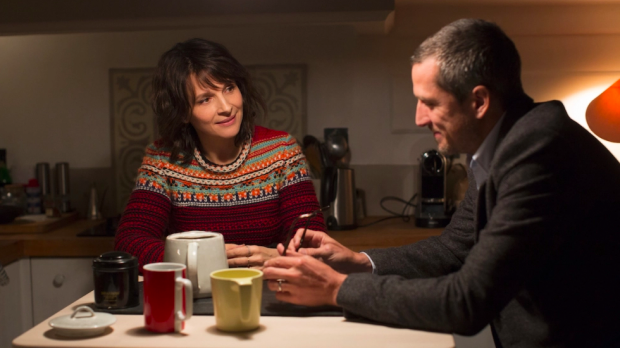
Directed by Olivier Assayas
Starring Guillaume Canet, Juliette Binoche, Vincent Macaigne, Nora Hamzawi, Christa Théret
Beginning in an unfussy and unimpressive style, Non-Fiction starts talking and just about doesn’t stop throughout its entirety, meaning those who don’t understand French will have their eyes glued to the bottom of the screen where the subtitles are for most of the film.
Similar to other talkative, mature films to have played at PIAF, such as last year’s An Unexpected Love, Let the Sunshine In (also starring Juliette Binoche), and Things to Come (directed by Olivier Assayas’ wife Mia Hansen-Løve), Non-Fiction is filled with conversations philosophising and musing over the usual topics (love, art, commerce, culture, e-books), though the characters here seem even more emotionally withdrawn than the aforementioned films – given the reference to aliens in its end credits song, this is likely on purpose.
These conversations are shared by Alain (Guillaume Canet), his wife Selena (Juliette Binoche), an author under his publication and Selena’s paramour Léonard (Vincent Macaigne), his wife Valérie (Nora Hamzawi), and Alain’s mistress Laure (Christa Théret) – a decent amount to keep up with.
These characters have no real arguments or much development through their lengthy conversations – the two couples seem to both be in a complacent stasis. Since this is a French film, there’s a lot of infidelity amongst them, some of these affairs not as successful as others, though there’s a general aloofness to this that never makes this cheating a large issue for the film to explore.
This sly sense of unrecognised ennui and inhumanness is, weirdly enough, part of the film’s charm. It may take until the ending credits song to catch onto this, yet the purposeful carelessness for both the characters and the film’s own aesthetic (utilising a very general docu-realist style) add up this sense from scene to scene, all the while keeping all focus on the realistically animated performances and the non-stop dialogue.
Non-Fiction may not be quite the sum of its parts, but it may be the opposite. It’s not a wholly engaging or even entertaining film, but it does work well as a curiosity in the cinema medium, favouring ambiguity and inconclusiveness. For all its strengths and weaknesses, Non-Fiction may work best on a VOD/streaming platform where viewers can enter and exit at their leisure throughout this piecemeal piece of work.
DAVID MORGAN-BROWN
Non-Fiction plays at UWA Somerville from Monday, February 18 to Sunday, February 24, 8pm, and at ECU Joondalup Pines from Tuesday, February 26 to Thursday, February 28, & Saturday, March 2 to Sunday, March 3, 8pm.